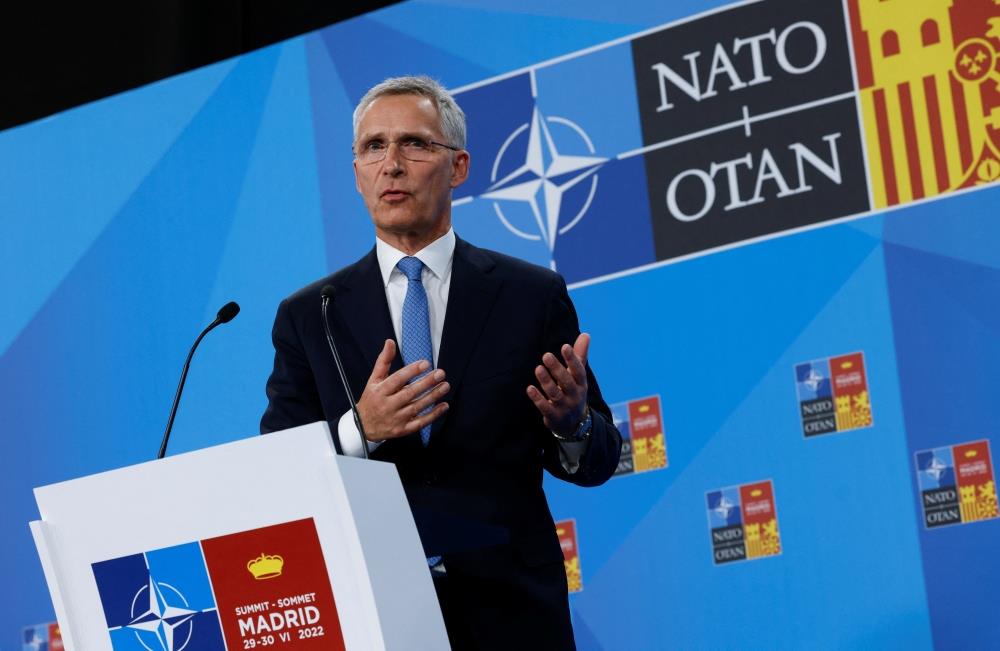
NATO Agrees Military Aid For 'Heroic' Ukraine
Madrid/Kyiv: NATO on Wednesday branded Russia the biggest 'direct threat' to Western security after its invasion of Ukraine and agreed plans to modernise Kyiv's beleaguered armed forces, saying it stood fully behind Ukrainians' 'heroic defence of their country'.
At a summit dominated by the invasion and the geopolitical upheaval it has caused, NATO also invited Sweden and Finland to join the alliance and pledged a seven-fold increase from 2023 in combat forces on high alert along its eastern flank against any future Russian attack.
U.S. President Joe Biden announced more land, sea and air force deployments across Europe from Spain in the west to Romania and Poland bordering Ukraine. These included a permanent army headquarters with accompanying battalion in Poland - the first full-time U.S. deployment on NATO's eastern fringes.
'President (Vladimir) Putin's war against Ukraine has shattered peace in Europe and has created the biggest security crisis in Europe since the Second World War,' NATO Secretary-General Jens Stoltenberg told a news conference.
'NATO has responded with strength and unity,' he said.
As the 30 national NATO leaders were meeting in Madrid, Russian forces intensified attacks in Ukraine, including missile strikes and shelling on the southern Mykolaiv region close to front lines and the Black Sea.
The mayor of Mykolaiv city said a Russian missile had killed at least five people in a residential building there, while Moscow said its forces had hit what it called a training base for foreign mercenaries in the region.
The governor of eastern Luhansk province reported 'fighting everywhere' in a battle around the hilltop city of Lysychansk, which Russian forces are trying to encircle as they gradually advance in a campaign to conquer all of Ukraine's industrialised eastern Donbas region on behalf of separatist proxies.
Ukrainian President Volodymyr Zelenskiy reiterated to NATO leaders that Kyiv needed more weapons and money, and faster, to erode Russia's huge edge in artillery and missile firepower, and warned that the Kremlin's ambitions did not stop at Ukraine.
Ukrainian Foreign Minister Dmytro Kuleba praised NATO's 'clear-eyed stance' on Russia and said the summit outcome proved 'it can take difficult but essential decisions'.
He added: 'An equally strong and active position on Ukraine will help to protect Euro-Atlantic security and stability.'
Kyiv has voiced concern that the West has been slow to offer it more than moral support against an invasion that has devastated cities, killed thousands and sent millions fleeing.
Russia says it is pursuing a 'special military operation' in Ukraine to rid it of dangerous nationalists. Ukraine and the West accuse Russia of an unprovoked, imperial-style land grab.
A NATO communique called Russia the 'most significant and direct threat to the allies' security', a nod to the precipitous deterioration in relations with Russia - earlier classified as a 'strategic partner' - since the invasion.
NATO issued a new Strategic Concept document, its first since 2010, that said a 'strong independent Ukraine is vital for the stability of the Euro-Atlantic area'.
To that end, NATO agreed a long-term financial and military aid package to modernise Ukraine's largely Soviet-era military.
'We stand in full solidarity with the government and the people of Ukraine in the heroic defence of their country,' the communique said.
The U.S.-led alliance said it would also deploy more 'robust in-place combat-ready forces' on its eastern flank, scaled up from existing battlegroups to brigade-size units.
Stoltenberg said NATO had agreed to put 300,000 troops on high readiness from 2023, up from 40,000 now, under a new force model to protect an area stretching from the Baltic to the Black seas.
Zelenskiy, in a video link-up with the summit, said Ukraine needed $5 billion per month for its defence and protection.
'This is not a war being waged by Russia against only Ukraine. This is a war for the right to dictate conditions in Europe - for what the future world order will be like,' he said.
NATO's invitation to Sweden and Finland to join the alliance marks one of the most momentous shifts in European security in decades as Helsinki and Stockholm drop a tradition of neutrality in response to Russia's invasion.
Russian Deputy Foreign Minister Sergei Ryabkov said NATO's expansion was 'destabilising' and would not improve its members' security.

Legal Disclaimer:
MENAFN provides the
information “as is” without warranty of any kind. We do not accept
any responsibility or liability for the accuracy, content, images,
videos, licenses, completeness, legality, or reliability of the information
contained in this article. If you have any complaints or copyright
issues related to this article, kindly contact the provider above.

















Comments
No comment